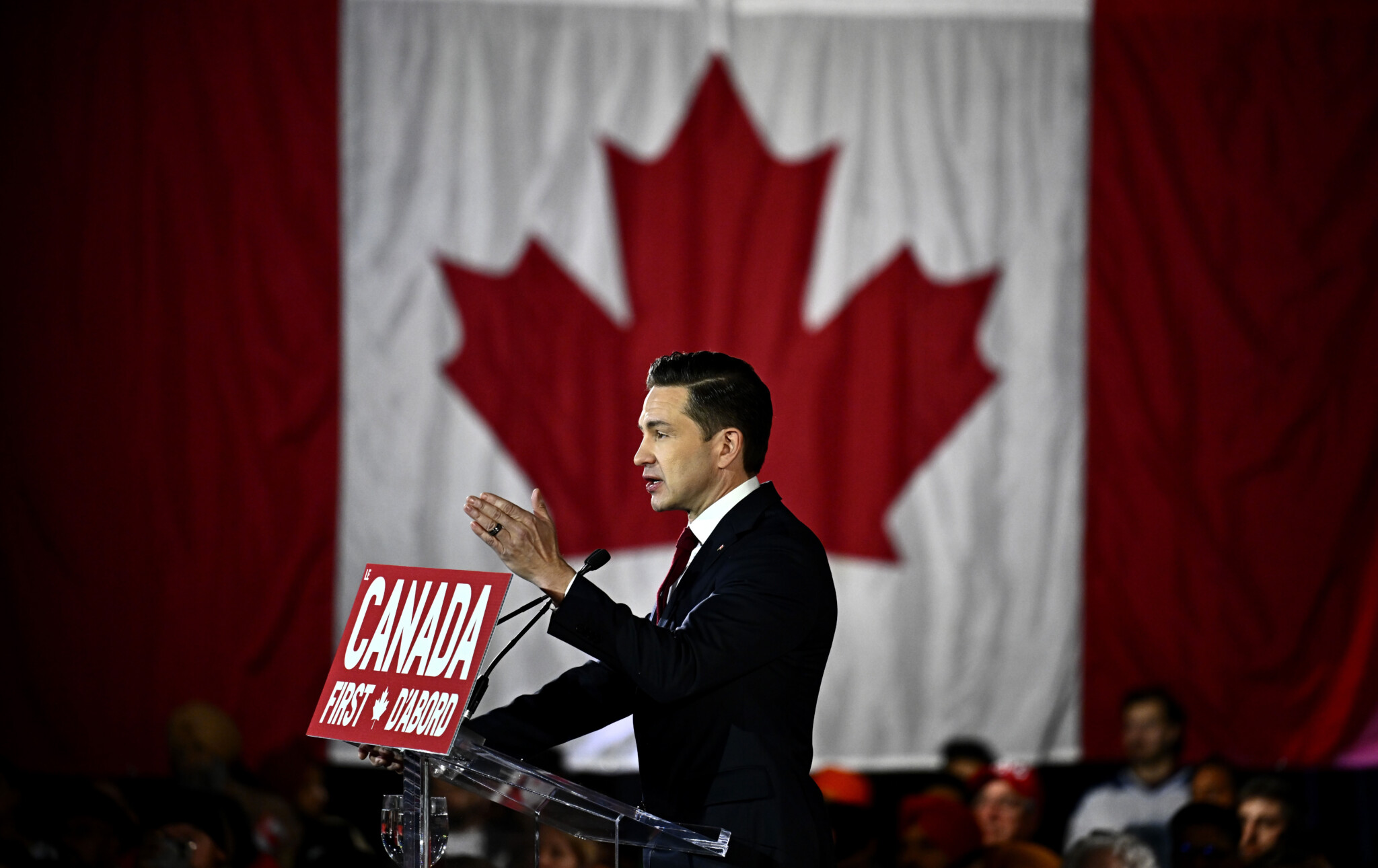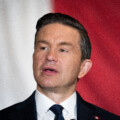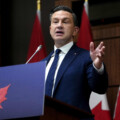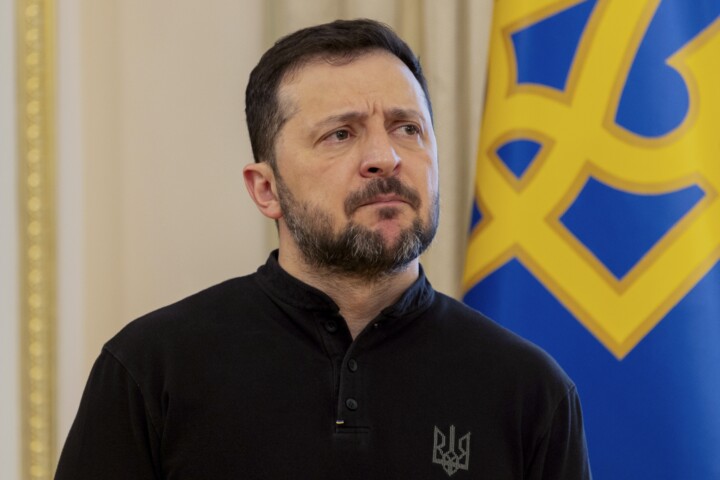All eyes were on Montreal Saturday evening as Canadians from across the country fixated on the Canada-U.S. hockey game for the 4 Nations Faceoff. Earlier in the day, however, another event was attracting the attention of the political world: Pierre Poilievre’s Canada First rally in Ottawa, where the Conservative leader gathered thousands of supporters to celebrate Flag Day and outline his vision for the country.
We gathered a host of The Hub’s top commenters and political insiders to react to the pivotal speech, analyze the key messaging and policy announcements, and break down how it may resonate with Canadian voters.
Poilievre’s most compelling pitch? Emphasizing the Canadian promise
By Sean Speer, The Hub’s editor-at-large
The goal of Pierre Poilievre’s speech was clearly to add a new element to the Conservative Party’s overall message and policy agenda. The speech’s focus on Canada-U.S. relations and how a Poilievre-led government would both engage with the Trump administration and enact policies to protect Canada’s economy are therefore its major takeaways.
If he becomes prime minister, his government’s policy now must be conceived with an eye toward managing the threat posed by Trump. New details on the timing of major project regulatory reform and what Poilievre called “the biggest and most patriotic tax cut in Canadian history” start to fill out the details of such an early governing agenda.
Considering that the speech’s goal was to signal to Canadians that the Conservatives understand the nature of the threat and are prepared to meet it, I think it can be characterized as a success. The speech and the accompanying visuals were effective on this front.
I must admit though that my favourite parts—indeed my favourite part of Poilievre’s message since he first ran for the party’s leadership—is his focus on social mobility or what he calls the “Canadian promise.” It’s the part of his message that connects directly to his own story. And one that resonates with millions of Canadians from different backgrounds, perspectives, and regions, including me.
I often tell people that whatever they think of Poilievre, he represents the best of us. There are few countries around the world—notwithstanding what Canadians think, the U.S. may be among the rare exceptions—where someone like him could aspire to be prime minister. Where someone born to a teenage mother, adopted by Saskatchewan school teachers, and raised in thoroughly middle-class circumstances could, in a single generation, be poised to become a G7 leader.
Protecting and cultivating the conditions that enable such an audacious aspiration—that allow for intergenerational mobility—should, in my judgement, be the principal focus of our politics.
The policy implications of such a focus are necessarily wide-ranging. Everything from economic growth to public safety to immigration (and virtually everything in between) is implicated. But as a lens for how we orient policymaking, it strikes me as the proper purpose of politics.
The coming days are bound to be chaotic and unpredictable. Poilievre and the Conservatives will need to be responsive to Canadians’ immediate concerns about Canada-U.S. relations and so we’re no doubt bound to hear a lot about tariffs and taxes and so on.
But I hope that in doing so they don’t lose the message about the Canadian promise. Because managing the Trump threat in the short term might be the means, but ensuring that future Pierre Poilievres can aspire to become prime minister ought to be the ends.
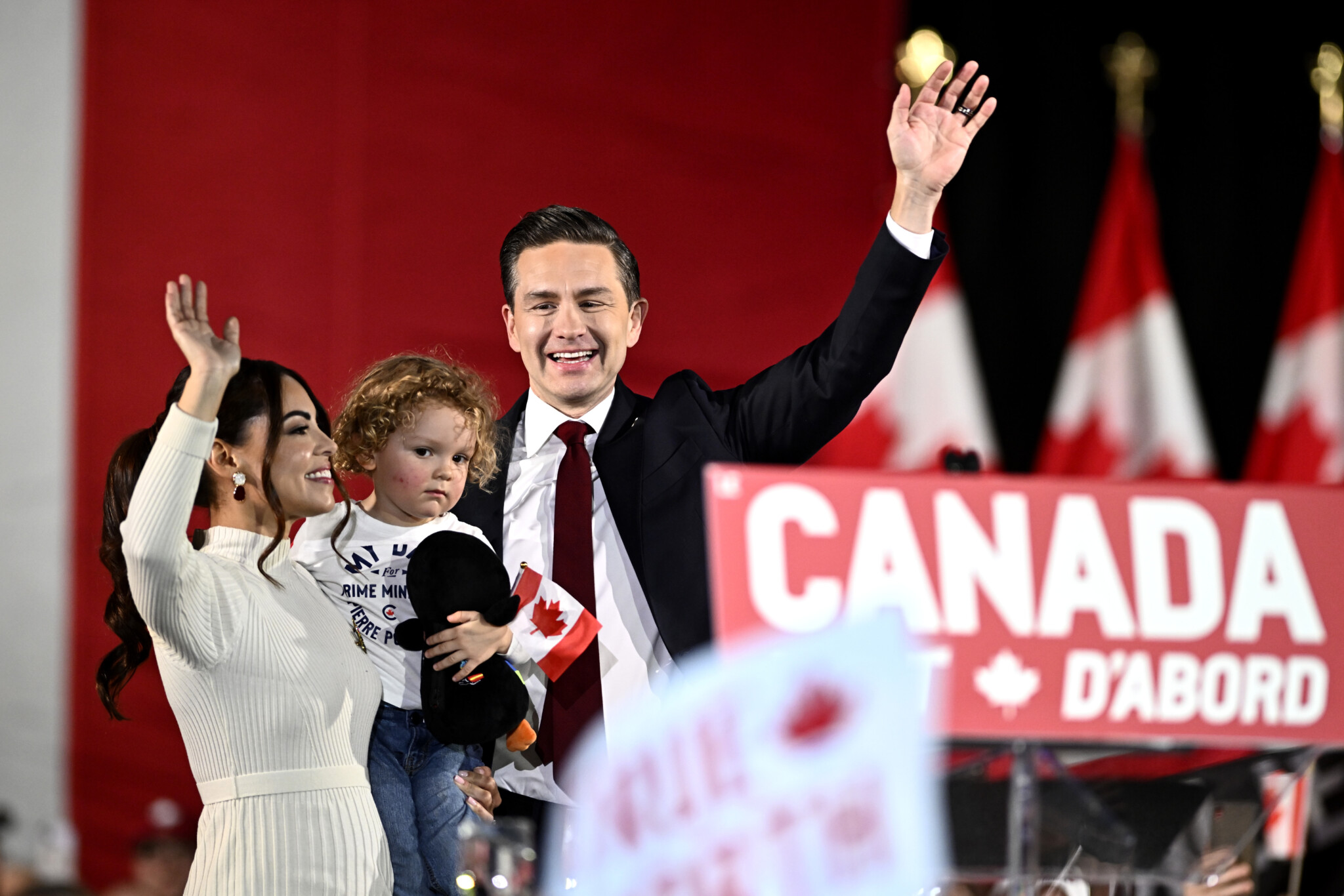
Conservative Leader Pierre Poilievre is joined by his wife Anaida and son Cruz before speaking at his Canada First rally in Ottawa, on Saturday, Feb. 15, 2025. Justin Tang/The Canadian Press.
Poilievre understands that Canada has to get tougher
By Howard Anglin, former deputy chief of staff to Prime Minister Stephen Harper
Since his leadership campaign three years ago, Pierre Poilievre has been obsessive in his message that he wants to make Canada the freest country in the world. On Saturday, he added a corollary to that promise, pledging also to make Canada strong, economically and culturally. “Strong and free.” I feel like I’ve heard that before. But it’s not just a patriotic slogan, it’s the minimum requirement for national sovereignty. “Strong and free” have to go together, but for too long Canadian governments have treated it like an either/or proposition, or opted for none of the above.
Poilievre’s speech put meat on the bones of the old slogan. He explained that strength and freedom each have external and internal components. Yes, strength requires the raw power to project force externally, but it also depends on strength of will, which requires a self-reliance and self-confidence that come from the heart. And freedom under the law is a great domestic benefit, but to guarantee freedom for its citizens a country must also be free from foreign influence or domination.
After laying out a plan for what has to change to rebuild Canada’s strength, Poilievre told the audience that the changes needed “will not always be easy” but then he asked, rhetorically, “Do you think making Canada was easy?” The history of Canada is a history of doing great things against long odds. For most of our history, hard work was more than a way of life, it was the only way of life. You worked hard or you didn’t survive.
Whatever comes next, if Canada is going to remain free we will need to toughen up. We must be able to deal with the world, including America, from a position of strength. We have to get our house in order to compete in a more callous and transactional world. If the worst doesn’t come, we will at least be stronger; but if it does, we will be ready. Otherwise we will be swept along in the skirts of the great powers squeaking impotent appeals to an obsolete international order.
The new messaging works—but more material is needed
By Scott Reid, principal and co-founder of Feschuk.Reid, former communications director for Prime Minister Paul Martin.
Pierre Poilievre wrapped himself so tightly in the flag that he nearly rubbed the beaver right off his own nickel. And it looked spectacular.
The Conservatives’ Flag Day pivot—which the Conservatives deny is a pivot—was a grand piece of stagecraft. Red and white covered the crowd. A patriotic avalanche buried all talk of broken Canada. And sharp new policy was delivered in a well-constructed speech. It was impressive.
There were only two problems—one small, one large.
First, Poilievre is not yet entirely comfortable in happy warrior mode. His new up-with-Canada messaging was occasionally forced and phonetic. This was punctuated by awkward DeSantis-like smiles that appeared at orchestrated intervals, fitting his face like a ballgown on a caribou. Still, he’s introducing fresh material and a lot of that can be cured with a little roadwork.
Poilievre’s bigger challenge remains Carney. Half the speech was a de facto confession of fear about the Liberal frontrunner. He was referenced constantly but spasmodically. If polls are correct that Canadians are intrigued by this newcomer, then something stronger than hysterically stapling his name to words like “Trudeau” and “carbon tax” will be required. The Conservatives need to isolate something more specific about Carney, something inherent about the man himself to disrupt his nascent public appeal.
As the Flag Day pivot concedes, the 2025 election won’t be won by recycling what worked in 2024. Poilievre has some good new material. But he’s gonna need more.
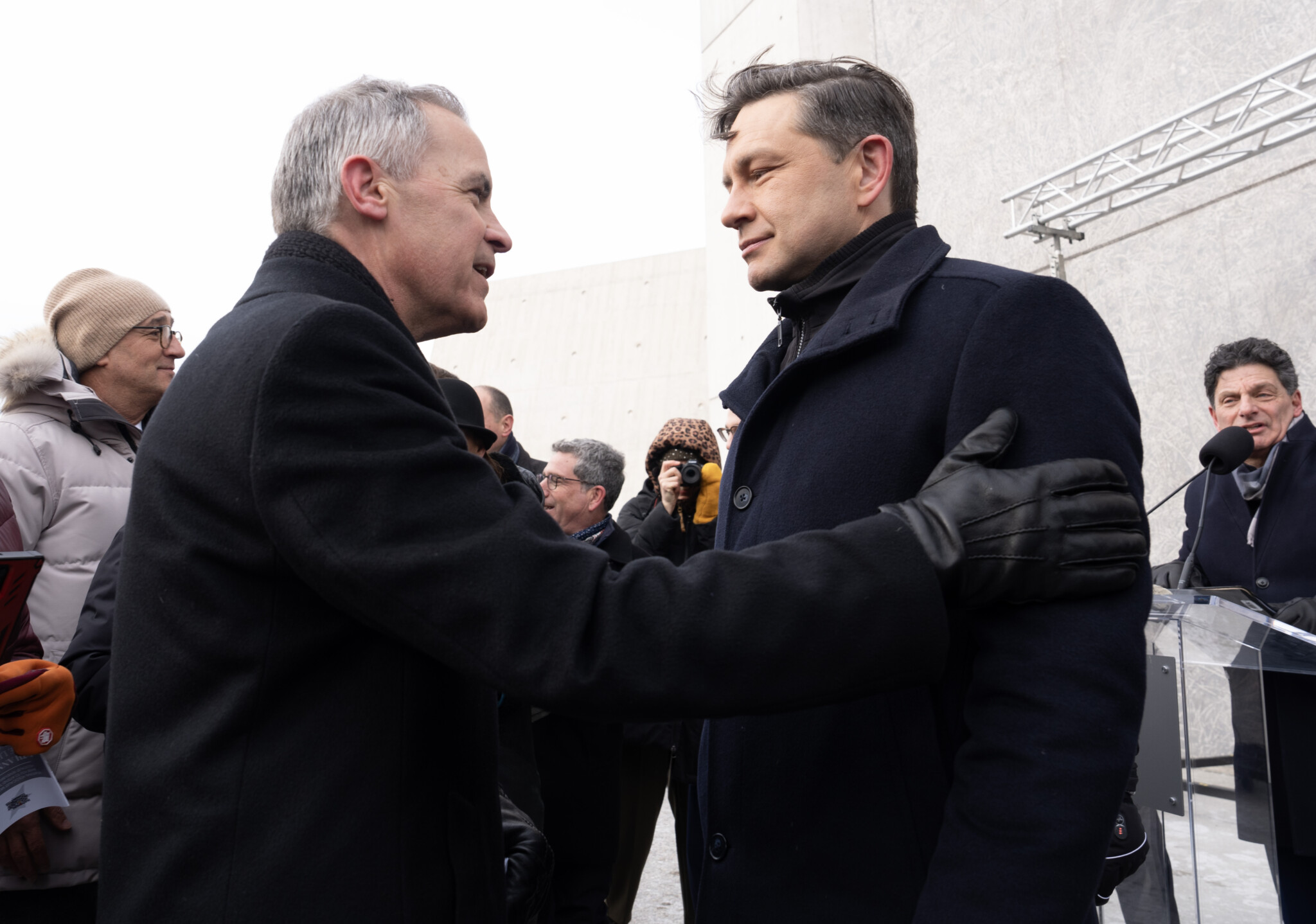
Liberal Leadership candidate Mark Carney speaks with Conservative Leader Pierre Poilievre before a ceremony at the National Holocaust Monument, Monday, Jan 27, 2025 in Ottawa. Adrian Wyld/The Canadian Press.
Mark Carney better be worried
By John Ibbitson, a writer and journalist
With Saturday’s powerful Canada First rally, Pierre Poilievre regained control of the political narrative. Mark Carney, assuming he wins the Liberal leadership, will be hard-pressed to win it back.
First and foremost, Poilievre captured the Canadian flag. He celebrated the Conservative tradition that has helped define Canada since the days of John A. Macdonald. “We love this country, and we will fight every day and every way to pass down to our kids the blessings we inherited,” he told the cheering Ottawa crowd.
He made it clear that he was no friend of Donald Trump, and that Canada under his leadership would “bear any burden and pay any price to protect the sovereignty and independence of our country.”
And he delivered a potent core message: that Carney was intimately linked to a government that had increased debt and taxes, stoked inflation and housing costs, and suppressed growth years before the tariff threat emerged.
Above all, the rally reminded us that, in this political crisis, a politician may be better equipped to rally the nation than a technocrat.
Poilievre should repeat that rally across the country in the weeks ahead. Because whatever the polls may say, he continues to command the political stage.

A supporter gets a sign before Conservative Leader Pierre Poilievre’s Canada First rally in Ottawa, on Saturday, Feb. 15, 2025. Justin Tang/The Canadian Press.
Going all in on ambition is smart
By Ian Brodie, professor of political science at the University of Calgary, former chief of staff to Stephen Harper
Pierre Poilievre showed the maturity of his statesmanship in talking about the threats from President Trump. He laid out a big-picture plan for a new security and economic relationship between the two countries, one that would boost work and salaries on both sides of the border, completing the work begun by Brian Mulroney and President Reagan 40 years ago.
But he also set the stage for the U.S. to reject his offer. We have to be ready for Canada to take a new turn in its own development, trading with ourselves and our other natural partners. We can’t hobble our economy with fantasy economic and environmental policies any longer. We have the room to build houses, the people to build great firms, and the resources to power a great economy. He chose to reach high and reach big.
The Conservatives are sticking to the same winning script
By Kate Harrison, vice chair of Summa Strategies, and a long-time volunteer within Canada’s conservative movement
Liberals and their media friends eager to see Conservatives abandon the agenda that led to a double-digit lead in the polls will be left disappointed in Saturday’s speech. Certainly, the context the Conservatives are navigating looks different today than it did a month ago, with Trudeau out, Trump in, and our nationhood being tested. But while the context is new, the content of the Conservative message is not.
In speaking to the moment we Canadians find ourselves in, Poilievre had a clear message: Canada is worth defending, we are kind but not weak, and we need new leadership to guarantee our collective success. That sentiment was reinforced by substance, underscoring the importance of economic sovereignty through an unleashed resource sector, and renewed military funding. Unlike the thoroughly contorted Liberals who seem to be changing policies faster than socks, the Conservatives can lean into the very ideas they’ve championed for over a year—not away from them.
Poilievre’s remarks should make clear to anxious Canadians that he is the only leader who can offer solutions to the problems facing the country—including the many that began well before January 20th.
Poilievre’s “Canada First” speech is the patriotic vision we’ve been waiting for
By Anthony Koch, managing principal of AK Strategies who served as the national campaign spokesperson for Pierre Poilievre’s leadership campaign
For too long, Canadian conservatism has been hesitant—almost apologetic—when it comes to celebrating our history, our armed forces, and the symbols that define our nation. That’s why Pierre Poilievre’s speech at the Canada First rally on Saturday was not just refreshing—it was necessary.
Hearing a Conservative leader finally speak with pride about Canada, unapologetically defend our military, and pledge to restore our national monuments was long overdue. For years, we’ve watched as national pride took a backseat to political correctness, and as our armed forces were neglected while politicians virtue-signalled their way through foreign policy. Poilievre’s promise to revitalize our military, protect our history, and criminalize the defacement of our monuments signals a shift back to what conservatism should be: rooted in pride, strength, and unwavering respect for those who serve and came before.
Equally as important was his firm rejection of a hyphenated Canadian identity. His message was clear: when people come to Canada, they should embrace being Canadian, not carry over old-world conflicts that have no place here. This marks a bold new direction in our political discourse—one that prioritizes unity over division.
This is the kind of leadership Canada desperately needs. Poilievre is finally giving conservatives a nationalist vision to believe in.

A Kingston Police officer talks with a man holding a Canadian flag before the removal of the statue of Sir John A. Macdonald in Kingston, Ontario on Friday June 18, 2021. Lars Hagberg/The Canadian Press.
What pivot?
David Murray, former director of policy for Pierre Poilievre, now senior vice-president at One Persuasion
Countless media personalities pre-branded Saturday’s speech as a major pivot for Poilievre, adamant that his plan to Axe the Tax, Build the Homes, Fix the Budget, and Stop the Crime needed to be discarded in order to meet the moment of Mark Carney’s coronation—and more importantly, President Trump’s shock and awe.
What we saw instead was a true doubling down of the previous messaging. Not with repetition, but rather as a set of flying buttresses supporting a new core nationalist vision for a true Team Canada movement. He meticulously laid out detailed policy proposals, the overwhelming majority he’s said publicly before.
We’ve been here before. In 1866 America terminated a trade agreement with British North America. This added pressure to unify the nation, and Sir John A. Macdonald met the moment. Poilievre won’t shy away from the Conservative Party’s pivotal role in building this country. The Liberals don’t have a monopoly on patriotism, and on Saturday, Poilievre proved exactly that.
While many will focus on what he said, what matters is what Canadians hear. On Saturday, they heard that Pierre Poilievre will defend our northern home, whatever the cost may be.
A manifesto for Canada’s 21st century
By Jamie Ellerton, is the founder and principal at Conaptus
Canada’s Conservatives are at their strongest when advancing an aspirational and obtainable vision for our country. Poilievre’s Canada First speech, on National Flag Day no less, was a manifesto for Canada’s 21st century.
Grounded in practical solutions, guided by conservative principles, it meets the moment to stave off the existential threats of today. More importantly, it builds up Canada, upon common values, for what Canada can be.
The vision offered is truly inclusive of all the people who make up our pluralistic nation. It spoke to a greater calling of what is possible in defending and advancing our liberal-democratic values to build a prosperous nation and build Canada into a better place than what we inherited.
In recent years, the harshest edges of the conservative movement have often come across as cruel, even resentful of what a modern Canada is. Partisan score-settling may make some salivate, but it is a small way to want to lead a nation and limited in its enduring appeal.
This moment demands we all sacrifice to build something much bigger than ourselves. The more Poilievre acts to advance the optimistic spirit of his Canada First manifesto, the longer he will be prime minister.
